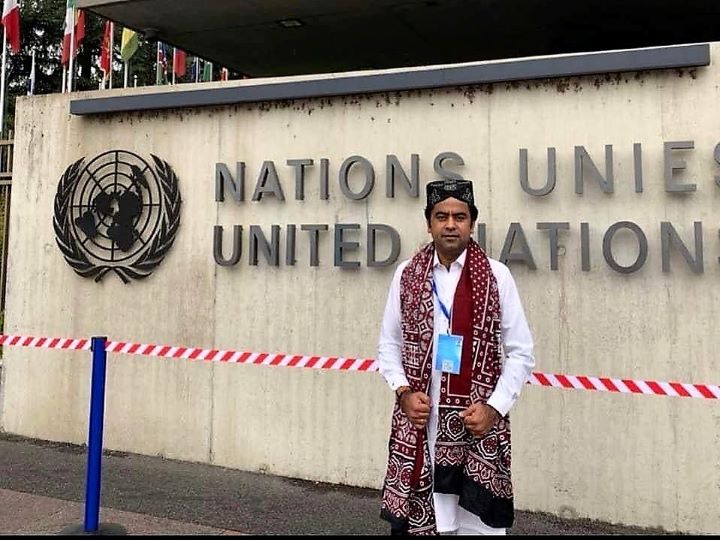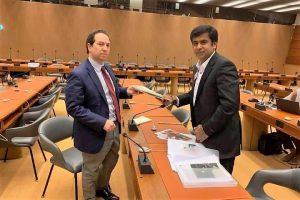

Shabrani in front of the UN office
Pakistan’s most prosperous province Sindh – that lies on the border with India, has grabbed eyeballs this year for sensational incidents. Earlier this week terror leader Mullah Sardar Hussain, from the banned group Jamaat-ud-Dawa and sister organisation Lashkar-e-Taiba (LeT) was killed by the nationalist group – the Sindhudesh Revolutionary Army (SRA). The SRA had earlier claimed killing former Al Badr commander Syed Khalid Razaoutside his residence in Karachi.
The financial and industrial powerhouse of Pakistan, Sindh is also known for its brutal assaults on underage minority girls, forcible conversions to Islam and marriages with old men.
The province has a long-running Sindhi nationalist movement with sporadic incidents of attacks on the Pakistani security forces and Chinese nationals working on the China Pakistan Economic Corridor (CPEC).
India Narrative catches up with Ghulam Hussain Shabrani, Central General Secretary of the Jeay Sindh Freedom Movement (JSFM), who has rechristened himself as Raja Dahir – the legendary historical ruler of Sindh during the eighth century. Shabrani, who managed to escaped to the US, also claims that he converted to Hinduism due to the fact that Sindh takes its identity from Hinduism.


IN: When did the independence movement start in Sindh. What were the reasons for it?
GHS: Sindh has been a separate country from Pakistan for thousands of years with its own demography, culture and language. In 1843 when the British East India Company attacked Sindh under General Charles Napier, it used to be an independent country under Mir Nasir Khan Talpur. The Company ruled Sindh through its divide and rule policy that lay emphasis on religion.
Later, after the partition of India, Sindh was handed over to Pakistan’s Punjabi-dominated army, which was a mercenary force.
In 1971, after Sheikh Mujib wanted to separate East Pakistan because of the excesses of the Pakistani Army on the Bengali people, it forced our leader GM Syed to rethink about the existence of Pakistan as an Islamic nation. He subsequently gave a call from the Sindh University for an independent Sindhudesh on 31 March, 1972.
Syed was then imprisoned by the Pakistani government.
Pakistani is a “gar-fitari political system” which in its constitution of 1973 completely ignored Sindhi culture, traditions and language. Our identity, that goes back thousands of years to the Indus Valley Civilisation was completely ignored. Also, a foreign language Urdu was imposed on us.
Pakistan got four provinces – Punjab, Sindh, Balochistan and Khyber Pakhtunkhwa. But Multan was merged with Punjab because of its population which would provide electoral majority to Punjab. GM Syed said this meant that the people of Sindh, Balochistan and Khyber Pakhtunkhwa provinces together would not be able to form a government in a federal country because of the population advantage bestowed to Punjab.
This advantage in seat representation to the Punjab province only grew after the separation of Bangladesh. Punjab got an unfair advantage in the Pakistani parliament. This also shattered equality among the communities. To many ethnic people, this meant that oppressed communities would not get rights under the Pakistani constitution or the Pakistani Army.
Our leader Syed said that Islam is not a religion for Sindh. He said that the religion of Sindhis is sanatan and the hero of Sindhis is Raja Dahir. He made it clear that Mohammed bin Qasim – an aggressor on whose ideals the Pakistani Army is based, is not the hero for the people of Sindh.
In 1955, Syed said in a speech in a conference that Pakistan would one day become a dictatorial State and those supporting the nation would repent one day. Today we see that the Sindhis want freedom, the Baloch want freedom and so do people in Khyber Pakhtunkhwa.
While Pakistan was created by the British, Sindh has existed for thousands of years since the time of Mohanjodaro. Sindh is the land of the Vedas, the Bhagwad Gita and the Ramayan. It is the land of Shiva and Shakti. It is not the land of invaders as people have been told in Pakistan.
IN: Why does Sindh follow the brutal practice of converting minor Hindu girls to Islam and marrying them to old men?
GHS: During Raja Dahir’s rule, when Mohammed Bin Qasim attacked Sindh, his army kidnapped thousands of girls and women and sold them in the streets of Kufa in Baghdad. It is the same mentality that still runs through Sindh and the Pakistani Army.
But you have to remember that it is in Sindh that still nearly 70 lakh Hindus live and the maximum number of temples outside India are located here. The roots of Hinduism still exist in Sindh as it is still the land of Shiv and Shakti.
The repercussions of anything that happens in India are felt in Sindh – the Hindus of Sindh left for India while the Muslims from Bihar and Uttar Pradesh came and settled in Sindh.
Even now, the industries in Sindh related to agriculture, rice mills, textiles and others are being managed by the Hindu Sindhi community. It is the Pakistani army that is harassing the Hindus by kidnapping and converting the Hindu girls.
But this leads us to another question – if Bangladeshi Muslims are committing atrocities on the Bengali Hindus, so will the same thing happen in an independent Sindh also? Will the Sindhi Muslims also harass the Hindu Sindhis. I don’t think this will happen as it is the Pakistani agencies like Military Intelligence, the ISI, the pir [Muslim holy men] who are involved in the kidnapping and conversions of Hindu girls.
For example, Mian Mithu, the notorious kidnapper and converter of young girls is given complete support by the administration. The prime minister and also the army chief – all the powerful people visit Mian Mithu. He is made a minister and is given full protocol by the government. Mian Mithu lives in Pannu Aakil military cantonment so that the Pakistani military can protect him, and also use him.
The Sindhi people believe that they are Sindhis foremost, not Muslims or Hindus. It is the government which is which is behind the attacks on temples and kidnappings of Hindu girls, and it is a conspiracy. The government thinks that by creating a divide between the Muslims and Hindus in Sindh, it will make the Indians and the international community feel that it would be a mistake to support the freedom struggle for Sindhudesh because of radical Muslims.
IN: What is the status of other minorities like Christians and Sikhs in Sindh. Do they have a future?
GHS: The people of different faiths in Sindh are the inheritors of the heritage of Sindh. The Sindhi people are not divided in the name of religion. Our leaders had said that people of all faiths are Sindhis first. Sindh is our land and belongs to the Sindhis. Under the Pakistani framework the minorities are looked through the lens of faith but this is not the Sindhi mindset.
IN: What is China doing in Sindh? What kind of business is China running?
GHS: The Pakistani Army has sold the natural resources of Sindh and Balochistan to China under the China Pakistan Economic Corridor (CPEC). This includes our rivers, ocean, minerals, oil and gas fields. The Thar coal mines in Sindh and even the power stations have been given to China.
CPEC has not only taken away our wealth and given it to China, it is also a genocide of our culture and way of life. Our villages, lands and even common areas have been snatched away. All around the Indus highway – villages, houses and even the kabristans have been broken or damaged. We feel the CPEC is changing our demography and culture.
The Pakistani Army has taken crores of dollars from China. This has made the generals corrupt and most have run away to foreign lands with the CPEC dollars.
General Rahil Sharif went to Saudi Arabia while General Pasha, the former DG of the ISI, went to Dubai. Similarly, allegations says that Ashfaq Parvez Kayani has properties in Australia and even General Rizwan Akhtar has left the country. The generals themselves had submitted a report to the parliament that most of our senior army officers have taken up citizenship in Canada.
Now Sindh and Balochistan have become a colony of China which has now perched itself in the warm waters of the Indian Ocean. We have seen that China corrupted politicians in other countries and took over their natural resources and ports. That is why we appeal to a regional power like India, Arab nations and global powers that they should help the Sindhis attain freedom.
IN: How is China exploiting the resources in Sindh?
GHS: China seeks to become a super power through the CPEC and the Silk Road. From Gilgit Baltistan, Sindh and Balochistan, the CPEC goes to Iran and Turkey and links up to Bulgaria which then connects to the Silk Road. It seeks to connect Central Asia, South Asia and European markets.
For this it needs access to the Indian Ocean which can happen only through Pakistan. Here corrupt Pakistani army generals fit into the picture. The CPEC is going to pose bigger problems for Balochistan, Sindh and India, therefore, it is important to support the Sindhi national struggle so that Pakistan is restrained and does not provide support to Khalistanis and terrorists in Kashmir.
Independent Sindhi and Balochistan nations will support India against Pakistan and China.
IN: Do the Sindhi nationalists want help from India? What kind of support do they want?
GHS: We need all kinds of support from India as it is a democracy and a regional power. We expect India, which is the biggest power in the region, to provide assistance similar to the way Pakistan has been doing in Kashmir.
You have to remember that Pakistan is carrying out a cultural and ethnic genocide in Sindh.
We find ourselves closer to India than Pakistan. Hindu and Sindh are derived from the same roots. Sindh is linked to the Bhagwad Gita, the Ramayan and the Vedas. Even the Indian national anthem mentions Sindh and we find it unfortunate that Sindh went to Pakistan after the partition.
We are resisting the Pakistani Army in various ways – at a political level and on ground. More than 300 Sindhi political activists have been killed, some through brutal extra-judicial ways. Bashir Khan Qureshi, Srai Qurban Khuawar, Maqsood Khan Qureshi, Rooplu Choliyani and Salman Wadho were burnt alive for raising the flag of Sindhudesh.
The Pakistani army still feels that the Sindhis are Hindus, therefore, they attack us at will. They do not consider us Muslims because they have always been suspicious of us. But born in Sindh, we feel proud of our Hindu roots. The Pakistani Army feels that we are asking for a Hindu nation.
We do not have as many colleges as we have cantonments and army camps in Sindh. We do not have schools but have nearly 35,000 madrasas. I hope India will support us and will acknowledge the emotions in its national anthem.
IN: Would the Sindhis prefer complete independence or merge with India?
GHS: Fundamentally, this is an internal question that we discuss among ourselves. We are hopeful of Sindhudesh becoming an independent nation in the future with help from India and the global powers.
Once we get independence, the Sindhu nationalists will sit down and decide how to govern Sindh.
Sub Lieutenant Astha Poonia officially became the first woman to be streamed into the fighter…
As Israel awaits Hamas's response on Friday to the latest proposal for a hostage release…
Deputy Chief of Army Staff (Capability Development and Sustenance), Lieutenant General Rahul R Singh, on…
A report on Bangladesh's media landscape has revealed that the restrictive laws and political press…
Prime Minister Narendra Modi has said that India is actively working on creating a comprehensive…
The Indian Chamber of Commerce (ICC) on Thursday hosted the 14th India Minerals and Metals…